Talking Heads: Alastair Campbell Meets Rugby League's Sam Tomkins

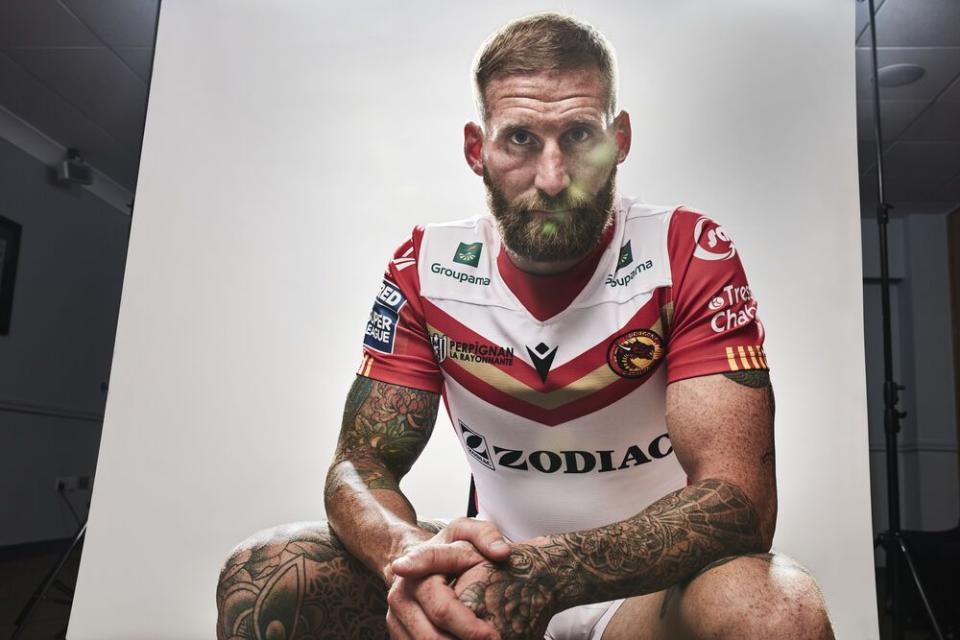
As Sam Tomkins steps down from the Catalans Dragons team bus, he looks very different to the giants in his way as he seeks his baggage from the hold. Weighing just under 13st, he’s built more like a footballer than a star of rugby league – surely one of the toughest sports on the planet, in which bodies get hit by the equivalent of a high-speed car on multiple occasions over 80 minutes.
If Tomkins had been born in Australia, where rugby league is a predominant sport, he would be a household name, much like top Premier League footballers are here. He is, however, very much an Englishman – captain, no less, of the England side currently preparing for the World Cup. But because rugby league in this country has always struggled to break out of its northern working-class stronghold, the chances are that many are unaware there’s even a World Cup taking place on home soil this year, let alone who its main players are.
I’ve never understood why rugby league isn’t more popular than rugby union – it’s faster, easier to follow and the players are among the fittest and toughest athletes alive. Tomkins has been one of its biggest stars for years, winning almost as many titles and trophies as he has tattoos on his heavily inked body. He has twice, almost a decade apart, won the coveted Man of Steel award for the season’s best player.
However, now aged 33, his career having taken him from Wigan Warriors to New Zealand Warriors, then back to Wigan before heading to France, he’s having to think beyond playing. A father of four young children (aged six, five, two and one), he’s seen as a leader and a model professional; his trainers view him as an ideal coach for the future. As it transpires, Tomkins has other ideas.
We meet in Newcastle in July, at the so-called ‘Magic Weekend’, during which all 12 Super League clubs play across two days at St James’ Park. It’s a real family festival, with fans from rival clubs mingling happily and barely a policeman in sight. But if Tomkins has no worries about his own ability to manage the next stages of his life, he nonetheless has plenty of friends who have struggled to make the transition from professional sport to normal life. He also admits to concerns about the state of the sport more generally. First, though, we talk about what anyone in rugby league will tell you is his greatest strength: his mentality.
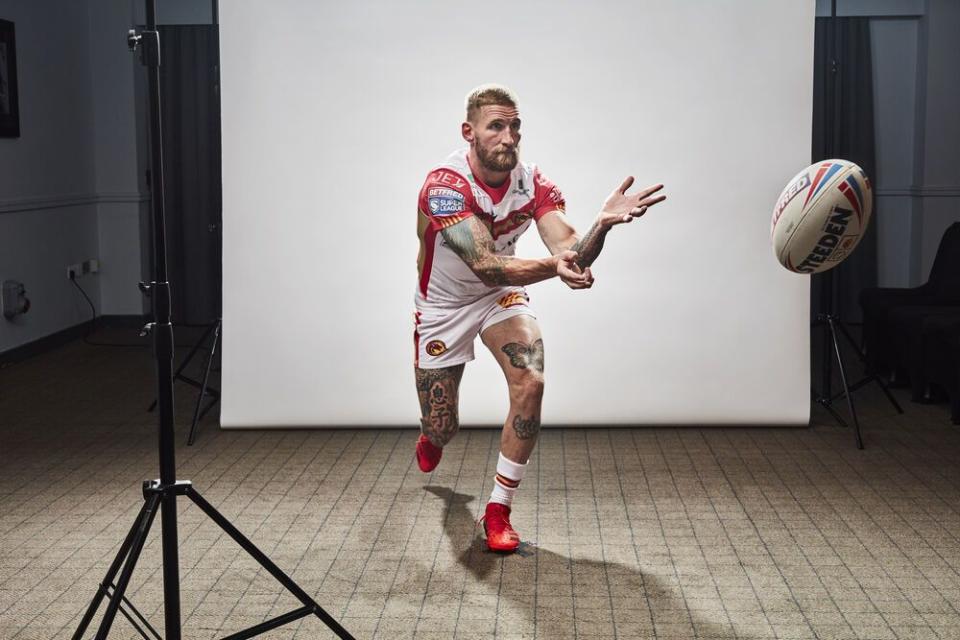
AC: How much of your success is down to physical strength and how much mental strength?
ST: Well, I don’t look like a rugby player, do I? It’s mainly mental. 70:30 mental. If you go back and look at the players I came through with in the academy at Wigan when I was 16, the ones who made it were not necessarily the ones who stood out for their physicality. I know plumbers who look like rugby players. But they haven’t got the mental side.
AC: So, how do you define your mental strengths?
ST: I am determined. I have a passion to compete.
AC: You know, there is a condition called maladaptive competitiveness [an extreme form of competitiveness, characterised by psychological insecurity]. Do you think you have it?
ST: I definitely have something. I have always competed more than other people, maybe because I was always the smallest, the skinniest. I had to adapt.
AC: When the ball is in the air, coming towards you out of the sky, and four blokes twice your size are charging towards you, do you not get scared?
ST: Maybe when I was five or seven – when I first started playing. But you get good at what you do. I’m flexible. I’m durable – often it’s not the biggest muscle-bound types who are the most durable. I have adapted to my shape.
AC: You haven’t even got a broken nose, though…
ST: I pass the ball before the big guys get to me. I’ve caused plenty of others to get their noses broken! [Laughs.]
AC: There was almost a decade between your two Man of Steel awards. What does that say about your mindset and endurance?
ST: The player who won it in 2012 and the player who won it last year are completely different people. The 2021 player is a lot smarter, 2012 a lot faster. We train every day to be in the best possible condition, but aged 20, 21, 22, it’s so much easier. At the same time, when you’re older, and you have a few hundred games under your belt, that experience gives you real edge. It’s just that your body doesn’t recover as fast; you haven’t got the same pace. I didn’t win it last year for being the fastest, like in 2012. I was the smartest.
AC: Are you conscious of ageing?
ST: Yes, physically and mentally. When I was in my early twenties, I might take a day to recover from a game. You’d still feel bruised but, within a day, you’re ready to train again. Now, if we have a game on Friday, I’m still hurting on Monday, a bit better on Tuesday, then by Wednesday, I’m ready to go again.
AC: Is your body not permanently bruised?
ST: Yeah, but you adapt. I was talking to Bradley Wiggins once – he’s a great guy, big admirer of rugby league – and he said, ‘I don’t know how you guys do it, putting your bodies through what you do.’ And I said, ‘Hold on, I’ve just watched you win the Tour de France! Those distances, those climbs, hours and hours with your backside in the saddle, and you do it day after day after day.’
AC: But he thought your sport was harder?
ST: He said, ‘We have no impact, no one is charging into us.’ I think what he does is far harder, but you just get good at what you do. I asked him what he did on his two days off on the Tour, and he said, ‘I just go out on the bike for four hours!’ I’ve never been on a bike for four hours in my life. They do that on their bloody rest day. Incredible.
AC: Which of these two statements do you most subscribe to? ‘I love winning.’ Or, ‘I hate losing.’
ST: Hate losing.
AC: It’s amazing how many athletes say that.
ST: The bad feeling I get when I lose is way stronger than any good feeling when I win. If zero is the norm, when I win I go to plus five. When I lose, I go to minus 10.
AC: Every game?
ST: Every game is different. If you played a good game as a team, and individually I played well, and you just get beat by a better side, though I never accept it easily, I won’t dwell on it for too long. I can see positives. But if we lose because we weren’t at our best, I don’t like that.
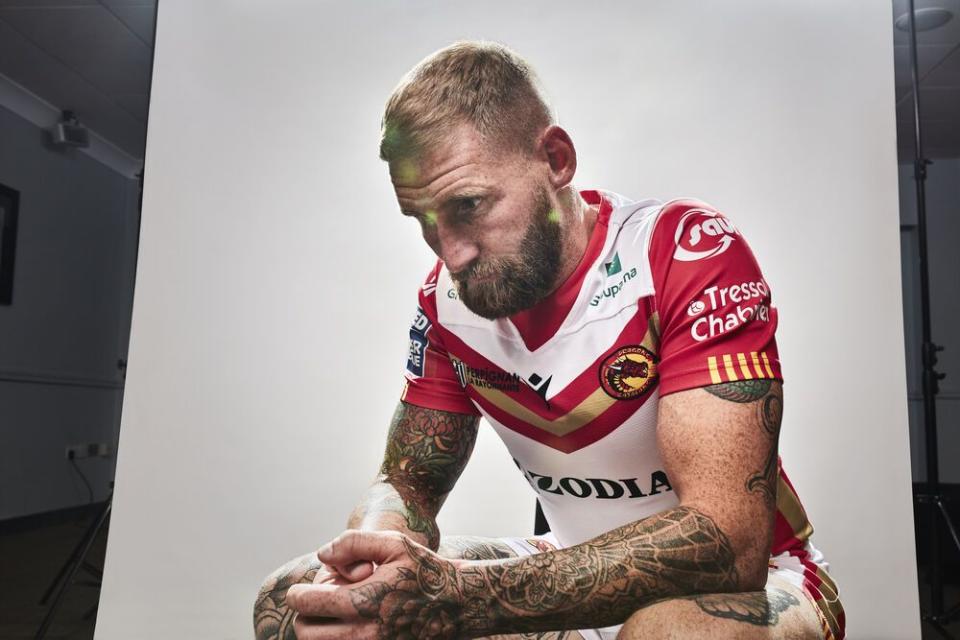
AC: So, when you lost by 12 to 10 in the Grand Final against St Helen’s last year…
ST: That was the worst ever. There were people saying it was a success because we reached the final, but for me it wasn’t good enough. I felt we had a genuine chance to win. We didn’t play at our very best. If it had been a mid-season game and we lost by two points to Saints, I could think, ‘Ah well, positives and negatives.’ But this was a final. We had one shot and we had to be at our best.
AC: And how did you see your own performance?
ST: I tore my MCL [medial collateral ligament] three weeks before. That’s normally an eight-week injury, but I was desperate to play. So I couldn’t do any running in those three weeks, and when I stepped on the pitch I had no confidence in my own knee. I was strapped up, I’d had injections and some tough conversations with the team doctor. He explained there was a risk that if it went wrong I would turn off the receptors to other ligaments in the knee. And that I might not come back from it. I said that I was ready for that. If this turned out to be my last game, and I had a catastrophic injury, I knew there was that risk at my age and I was ready to accept it.
AC: Did you feel responsible for the defeat?
ST: I’m not the reason we lost – you need some luck in close games like that. But if I had been fully fit, and if I’d been training properly, I could have done better.
AC: What do you do with teammates who are not fully on it?
ST: I tell them.
AC: Is that easy?
ST: Yes. It’s never personal. It’s about rugby. If the big guys in the middle – who are meant to be defending and getting back from every tackle – if they’re not moving as they should, I’ll be giving them a bollocking. I have to do that and they expect it. The majority of arguments on the field are that. Or they’re tactical. It’s never personal.
AC: Your brothers, Joel and Logan, were also professionals. Joel switched to rugby union. Do you regret that you never gave it a go?
ST: I agreed to go to Saracens in 2011, but the deal fell through. I would have liked to try it because there are parts of my game I think would be good for union. But I don’t regret it because I went on to do other things. I played in New Zealand, and now France, which I love. I think we’ll stay in France when I stop playing. The kids love it. The kids are growing up bilingual, which is brilliant.
AC: How is your French?
ST: Not fluent, but I get by.
AC: Is Brexit not a problem for staying long-term?
ST: I signed for the Dragons before Brexit and I’ve got a five-year carte de séjour [residence permit]. The new signings only get a year and if they’re out of contract it gets tricky.
AC: How conscious are you of the class difference between League and Union?
ST: It’s there, isn’t it? When Joel went to Saracens, he reckoned there were only three players in the first team who weren’t privately educated. And they all went to St John Fisher, the same school in Wigan that we went to! Joel had never met anyone who went to private school before. But what he found was that, once you were over ‘he’s the son of a Lord, he’s the son of a plumber’, it just became another rugby squad. Same for me. In England, France or New Zealand, there’s always the joker, the loner, the grumpy one. It’s the same the world over.
AC: So, what are your plans when you retire?
ST: I want to do more media. I really enjoy it.
AC: You’re good at it. I’ve noticed you never umm or aah, and you never say, ‘Like I said’, which is what so many sportsmen say, even before they’ve said anything.
ST: With Aussies, it’s always, ‘Ah, look…’ Any question, it’s, ‘Ah, look…’ Look at what? [Laughs.]
AC: I’ve never really got how players can enjoy punditry because it must be so second best to playing.
ST: I love rugby and I know a lot about it. So what’s not to like about people asking you questions about it, talking about it?
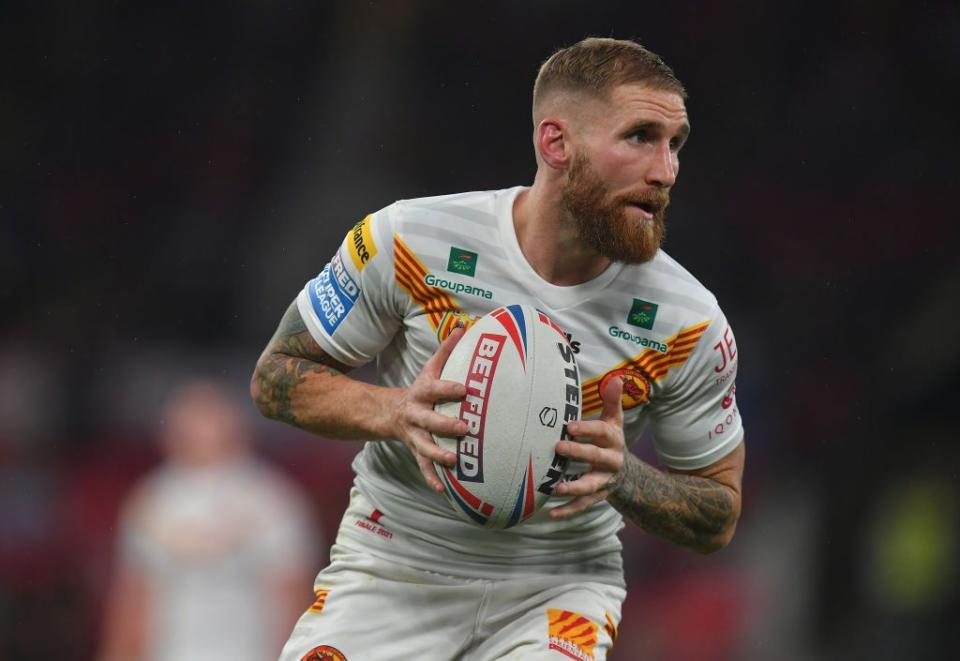
AC: But it’s not very challenging for someone like you. Surely coaching would be a better challenge?
ST: I wouldn’t coach.
AC: Why not?
ST: I’ve seen too many coaches go bald.
AC: I’ve just been talking to Steve McNamara [Catalans Dragons coach]. He’s still got his hair.
ST: It was jet black a few years ago – it’s grey now! Maybe I could do positional coaching, looking after the spine players, or the fullback and wingers. But I don’t have that drive in me to want to build my own team. I’m good friends with Shaun Wane [England coach] and he talks about having his own team. The coaches are like, ‘It’s my team versus your team.’ That’s not me.
AC: But you’ve always had that drive as a player.
ST: Maybe, but it’s different. In the England camp last week, I did an off-the-cuff talk to the players about how we should be as a squad for the World Cup – our identity, our DNA. One of the coaches said I was talking like a coach.
AC: Well, you were. You were showing leadership.
ST: I’ve had leadership roles from an early age, as a player. But coaching doesn’t fire me up.
AC: Do you have good mental health?
ST: Yes. I think so.
AC: Ever had dark times?
ST: I’ve had dark times through injury.
AC: What’s worse: a bad defeat or a bad injury?
ST: A bad injury. I’ve only had two big ops. I was out for six months when I snapped a ligament in my knee. Then I broke my foot in 2016, which was nine months out. That was the worst. I had lots of metalwork.
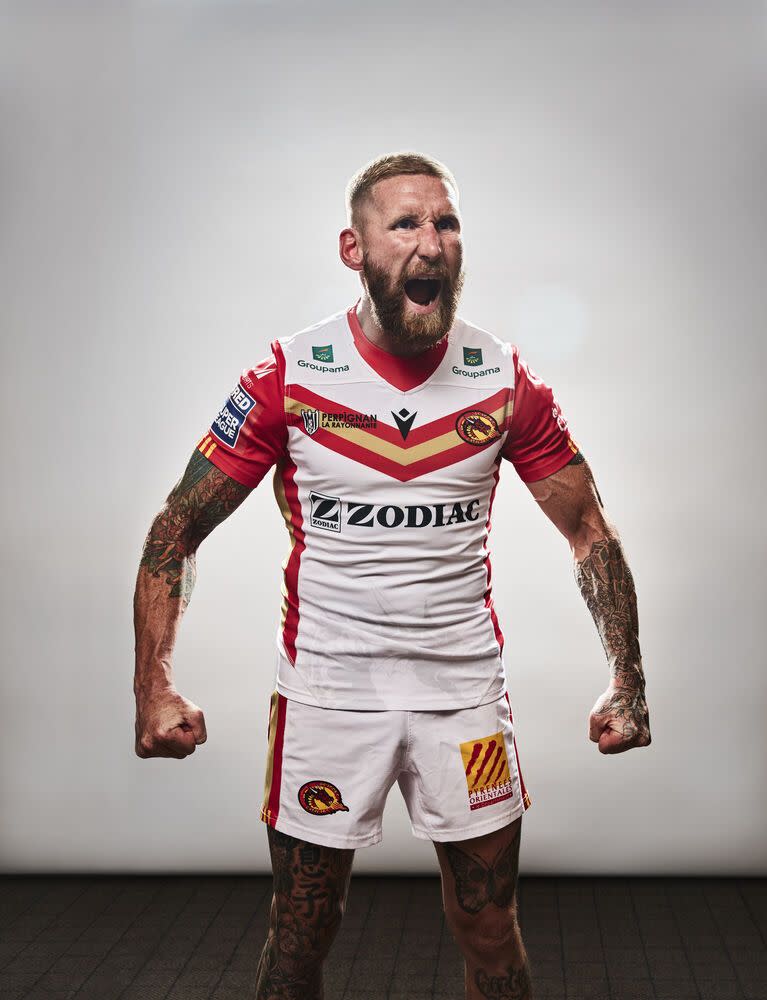
AC: When you’re a big part of the squad, and then out with an injury, do you feel left out and isolated?
ST: You feel guilty. The biggest thing for me is guilt. I go to all the games and it’s horrendous. I’m feeling every second of the game. I’m bracing for every tackle. And if a player makes a mistake, I’m thinking, I would have done this, done that.
AC: So, it’s your fault if you’re losing, because you’re not there?
ST: Yeah. I know it’s irrational. It’s an irrational guilt, it makes no sense. But that’s me, I can’t stop thinking like that. Some players get injured and they don’t even go to the game. They’re not bothered. I couldn’t do that. But we’re all different. If I’m not playing, McNamara likes me to sit with him and talk. Because I see things differently – from the players’ perspective.
AC: So he sees you as a coach, too.
ST: The good coaches are always asking players what they think. They don’t pretend to know everything. Shaun will often say to a player, ‘You know better than me, so what do you think?’
AC: When you’re playing with your kids in the garden, do you let them win?
ST: Reluctantly, yes. If my missus is watching! [Laughs.] The older ones have started playing rugby league. It’s massive where we are in France and I don’t want to be that dad on the sidelines, screaming at them. My dad was like that. My mum was all like, ‘Go to school, learn, be intelligent, be nice people.’ But my dad was like, ‘Be the best rugby player in the world!’ It was like the angel and the devil. And if I see my son not giving enough, I will tell him.
AC: Would you find it difficult if they weren’t interested in rugby league?
ST: No, not at all. If they were into football, I’d be the football dad shouting from the sidelines.
AC: Will you know when it is time to call it a day?
ST: Yeah. I have signed for next year and if that was my last year as a player that will be okay. I like my life outside rugby.
AC: How did your brothers do when they retired?
ST: Logan is an interesting one. He played rugby league because it gave him an okay living. He was never a £300,000-a-year player, but he was a 50, 60K player, so it was a good-paying job. He won the Challenge Cup and the like, but he didn’t love it. It wasn’t a passion. When he retired after a bad foot fracture, he joined the fire service. Joel is in the fire service, too. They’re both good at it.
AC: Will you have more of a freelance kind of life?
ST: I think so. I could retire and have a passive income from property, but I want to do something I really want to do. I’ve seen players leave the game and crash horrendously. More should be done to stop that. Young players need more education. I’ve been at clubs where an 18-year-old on £30,000 leases a car for £1,000 a month, not realising that doing that at 20 could affect him at 30. Don’t get me wrong, I’ve bought all sorts of crazy cars – I’ve not had a Vauxhall Astra for a long time – but it was always within my means. It’s back to the class thing. A lot of players in our sport are from tough backgrounds – they’ve not always had a great upbringing, not had the best advice at home. I’d be happy to work with young lads, mentoring and helping them.
AC: You’re talking like a coach again.
ST: I’m talking life advice here, not rugby. Some players really struggle after retiring because the game is everything. Then it goes and there’s a big void. I’ve seen it right across the spectrum. I’ve got friends who’ve gone on to be successful business people, friends who have gone on to good jobs. But I’ve also had friends who have gone to very dark places after they’ve stopped playing. They don’t always say it, but I read it and sense it and try to help if I can. Mental health is so personal. Something that might seem minor to one person can be major to another.
It’s inevitable in the job we are in – you’re under huge mental stress from an early age – but it’s all related to something that doesn’t matter to the rest of the world. No one cares apart from you. I can go home and all I’m thinking about is getting my knee right for training. That sits in my head all the time and it doesn’t matter to anyone else. Absolutely nothing in the world is going to change if I don’t make training. No one knows but you. I had a friend who had horrendous injuries all through his career, then one day a specialist told him he couldn’t play again. I’m like, ‘Oh, I’m gutted for you, pal.’ But he was beaming. He said, ‘I can’t tell you how happy I am, because for the past two years I have been in mental torture. I couldn’t even walk the dog in case the injury flared up.’
AC: He was relieved to be told it was over.
ST: Yeah. He had been beating himself up for being injured and it was agony – physically and mentally. I try not to beat myself up like that. Having a family changes your mentality. I can’t moan too much about my sore shoulder when the kids are demanding I throw them in the swimming pool.
AC: How do you see the sport as a whole at the moment? I love it and can’t understand why more people don’t. But it feels a bit stuck right now.
ST: It does, yeah. It needs a shake-up. Smarter people than me are working on it, but we need to be more forward-thinking. Too many people want to keep things as they are. When Toronto got kicked out of the league, and then we were getting Toulouse in, people were saying, let’s have Batley and Leigh. But if we’re not careful we go backwards – a slow decline to a part-time sport. We need more innovation, not less. We’re here at Magic Weekend. People love it. All the teams on the same field across a weekend. You can’t do this every weekend, but that’s the kind of innovation I mean. Too many people want things to be like they’ve always been.
AC: Why has it never taken hold in the south, given that it’s such a great sport?
ST: I think it’s about the marketing.
AC: But Sky Sports do a good job with it.
ST: You need the grassroots, too.
AC: Now listen, I’ve got to ask you about your tattoos. How many have you got?
ST: I’ve lost count, they’ve all melded into one. My body’s covered, my legs.
AC: Raheem Sterling told me he thought it was an addiction.
ST: I’m a walking advert for tattoos. I love the look. I remember as a kid watching a match in Australia on TV and Mat Rogers came on with two full sleeves, and I thought, ‘That is cool, I want a bit of that.’ My first one was a quote by [former NFL coach] Vince Lombardi [he lifts his shirt to show me the tattoo across his stomach] and then a month later I got another one, then another one, and now, well, yeah, it’s grown and grown, and I’ve ended up like this.

AC: How many of the current Catalans squad don’t have a tattoo?
ST: I could count them on one hand.
AC: What’s your relationship with social media?
ST: I use it as a tool for myself. I have a professional account, as it were, and then a personal one for family and friends.
AC: How do you deal with the abuse?
ST: It’s not real life, is it? I can’t believe how many people think it’s real life. If you don’t want abuse on social media, there is a very simple remedy – delete your account. Or if you use it to keep up with the news and see what other people are saying, create an anonymous account. I have never, not once, had someone say to my face the kind of stuff they say on social media.
AC: It doesn’t bother you when people slate you for how you play?
ST: I’m from a town where rugby is a religion. There’s 300,000 people and 250,000 of them are rugby experts. They stand at bars and say that if only they hadn’t twisted their ankle when they were 13 they would have smashed [Wigan player turned coach] Sean O’Loughlin. Yeah, of course you would! And now you’ve got a Twitter handle and you’re telling a professional player he’s rubbish. It’s comical.
AC: But some players do let it get to them. I’ve seen it.
ST: I know. They come off after a game and the first thing they do is check what people are saying about them. Someone ‘@s’ you and says you’re a dickhead. He’s probably 12 years old, never played. He wouldn’t say it to you in the street, so why are you bothering with it? You’re the stupid one if you let it bother you. If it really bothers you, go and find him. But what’s the point? If you die in a computer game, you don’t sit down and plan your funeral, do you? Because you’re not dead [laughs].
It’s not the real world. Social media isn’t the real world either. It’s like when you get booed during a match. It’s not the real world, you’re just playing a role as a baddy in entertainment. I’ve never been booed in the supermarket buying the bread. It’s the same people! I’ve never had anyone shout at me while I’m buying apples, ‘Hey, Tomkins, you’re a wanker!’ It just doesn’t happen.
This article originally appeared in the October issue of Men's Health.
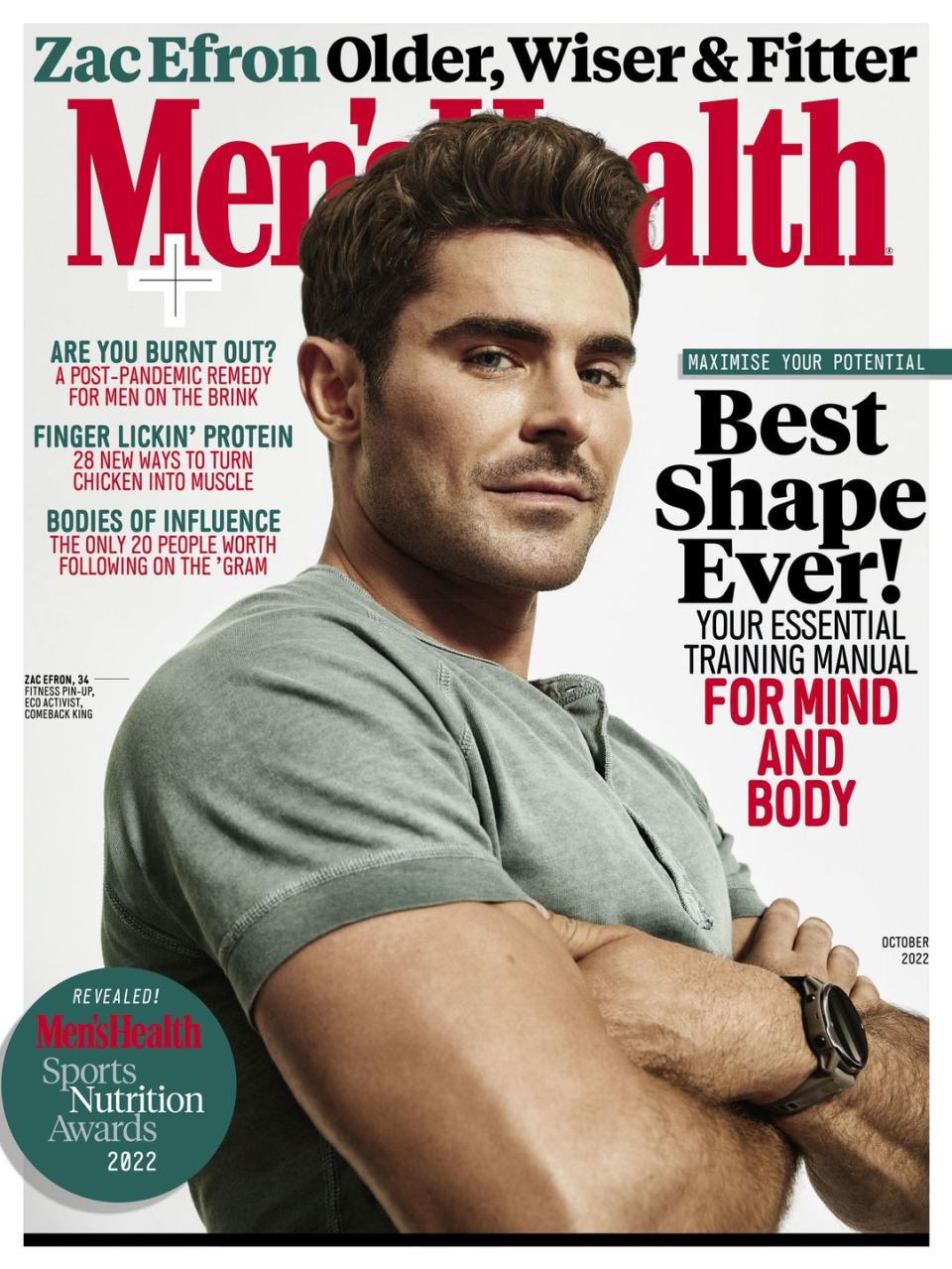
You Might Also Like


